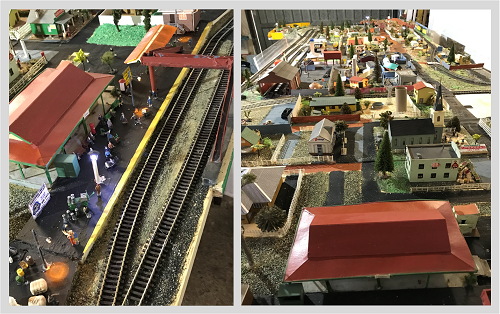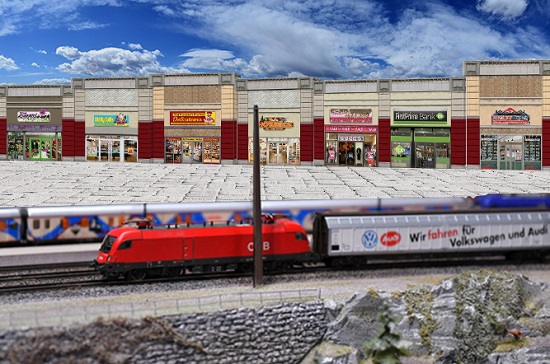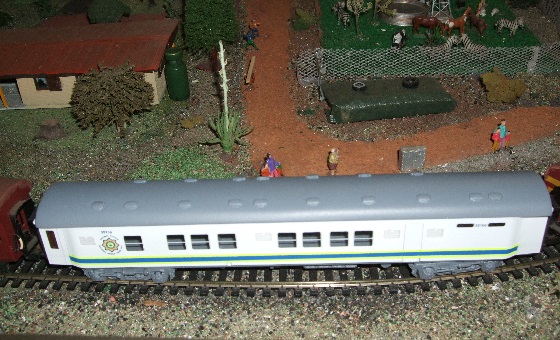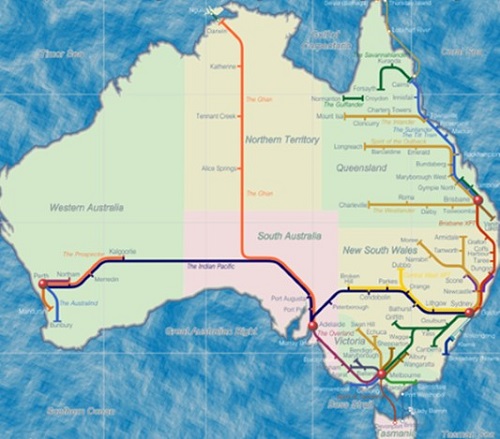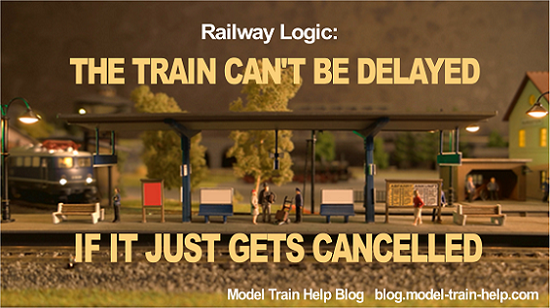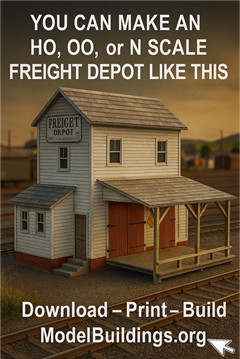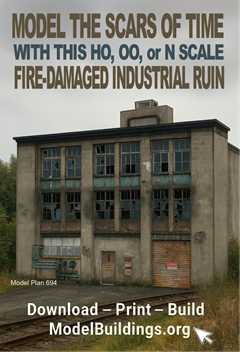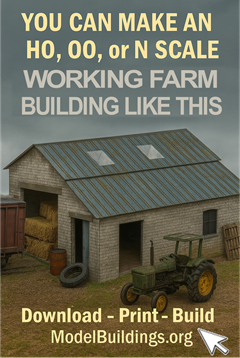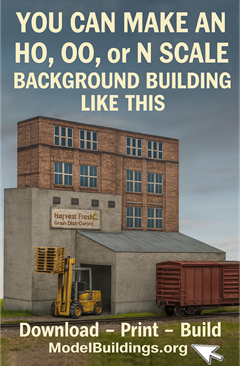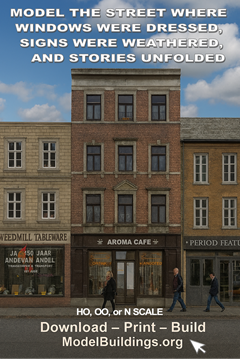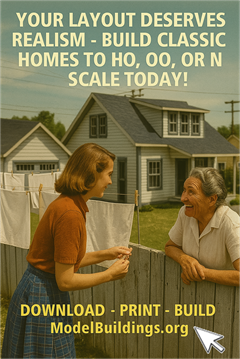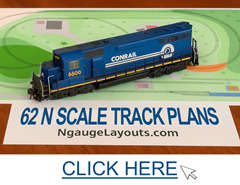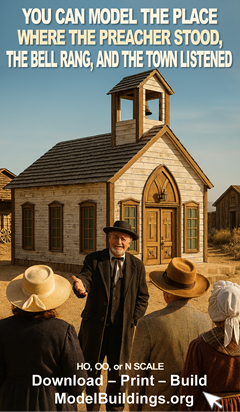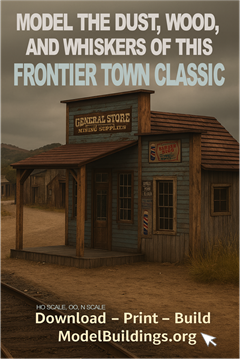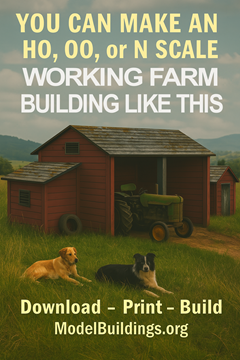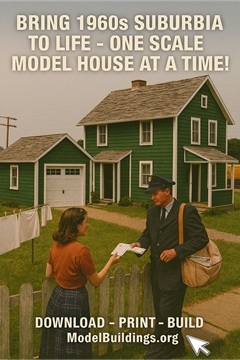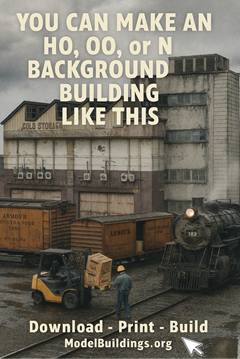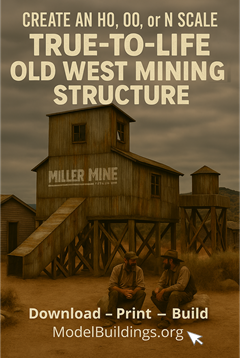Everything on model trains, model railroads, model railways, locomotives, model train layouts, scenery, wiring, DCC and more. Enjoy the world's best hobby... model railroading!
Engine and Track Problems
Jim models in HO scale and writes:
“Here’s a goodie – a problem half solved that created an even bigger problem. I had a 19 degree crossing (code 83 ) installed on the layout. I filed the track down to make everything run smooth.
Finally, I found a steam engine, a 4 – 6 – 2 that I liked. I started running it with some wood reefers. It seems every time that engine came to the crossing, it needs a push to get it through! UUGGHH! Only to discover that all of the other track I had on the shelf that I used to build this little 4′ X 4′ layout was all Code 100 track.
I found a new 19 degree crossing at a hobby shop, so bought it and removed the code 83, and installed the new code 100 crossing in the same location. Problem solved???
WRONG!!! The engine still needs to be helped through that crossing. WHY???? Otherwise, the engine runs just fine throughout the rest of the layout.”
Any thoughts to assist Jim please?
What To Use For Skirting Around Layout
Simon models in N scale and asks:
“Suggestions please for types of skirting below the layout to hide the wires and stuff I pack underneath it. Thanks guys.”
Add your thoughts below.
Peter Upgrades His Layout
Peter Field from South Africa recently upgraded his model railway prompted by one board warping which had to be replaced. Peter writes:
In 1985 I built my first layout which was 150×120 and was an oval type of layout that served me for many years +-34 to be exact as this layout was used as a demonstration layout and convention layout. In 1990 I built my first permanent layout which was again 150×120 and over the years added on to it until it became 3.0x120m and in 2019 added my last extension bringing the board to 5.0m x 1x20m and in September 2021 had to replace the original board due to warping and put in a scutter board of 2.0m x120 which lies diagonally across from the original two other boards making the board 8.4m in total length by 3x20m across. The board is based on the SAR in the 1950s to mid-2000s when steam diesel and electric traction worked side by side.
The passenger rolling stock goes from the wooden balcony coaches of the 1950s to the present steel passenger rolling stock and has the Blue train South Africa’s premier train and a Metro train.
The Goods or freight wagons range from Coal, Fuel, Cement, and container trains made up as unit trains or general freight trains, or general goods trains.
The locomotive roster is Electric locos Class4E, Class5E, Class 6E, Class 7E. Steam locos comprise Class 16E 4-6-2, Class 15CA 4-8-2, and Class 24 2-8-2. Class 6 2-8-0 whilst the diesel locos range from Class31 from the late 1950s to Class 34, Class 35, and Class 36 shunter loco.
How do I run all these locos at once, I select 5 – 6 and use them as required and after a period of three months swop them over with other units and do likewise with the rolling stock.
What does the layout comprise of well it is based on a small village north of PIETERMARITZBURG called Hilton which is a village with various trains running through the village?
The layout consists of a few small farms, some small holdings some just outside the village, the village itself has a Church, One Stop garage, small shops, a post office, station which is modeled on the actual Hilton Station here dating from 1880’ and the container depot and Loco facility plus some houses and smallholdings and past the game reserve, Jenny’s Furniture factory and past the Container depot and into the station again.
Let’s take a journey on my train leaving the station the train does the right-hand curve past the Anglo Boer war Blockhouse and over the river into a left-hand corner past the loco sheds and past the shunting yards, which contain the Cat Factory, then we reach our first farm which is a typical African farm with the farmhouse, dam, and windmill, and sheep grazing in the paddock with a cattle loading platform, to the right-hand side there is a branch line going to the coal mine which is in the mountain and a coal staging point for loading the coal wagons from this point the track makes a right turn past a Xhoza village and into a mountain cutting which is part of the coal mine then through a tunnel and back onto the main straight past another farm and the Squatter camp and the track makes a slight right turn past two small
holdings and over the points onto the mainline of the new board past Jenny’s Furniture Factory and the Container depot and into a cutting and over the points and into the two-line Hilton village station which is then the end of the journey on my train.
Scale Model Shopping Street Idea
Here’s an idea for a shopping street scene against a background on a model railroad layout. The plans and scale sizes at https://www.modelbuildings.org/packb-background-shops-railroad-scale-models
Mobile Police Charge Office South African Railways
Regular contributor Peter Field from South Africa sent in this article to share:
In 2010 when South Africa hosted the world soccer Cup crime was thought to become a problem on certain trains in operation, with drunkenness, rowdiness, and hooliganism.
Transnet built some +-12 mobile police stations which would be attached to certain passenger trains in certain areas where they thought they would experience problems e.g. Johannesburg to Durban and other main cities. These were hooked onto the rear of the train or behind the locomotive.
Should there be any trouble they could be charged on the train and then removed by the police at the destination to be dealt with by the courts. Each coach contained a charge office, counseling office three or so
compartments for the staff to reside in with a shower, toilet, a small kitchenette, and four cells. They fell into disuse after the world soccer cup and were in storage. However, in the last few years, I have seen them attached to container trains that are manned by the police. When the trains are stopped for a long period the police patrol along the train to safe guard the containers from break-ins as theft seems to be a problem at long stops or driver change over points. This method has stopped the break-ins of containers en route to their destinations. This photo shows a mobile police charge office on Peter’s layout.
Hinges For OO Engine Shed
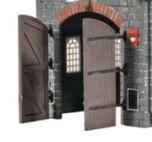
Gary asks:
“How do I fit the hinges to a ratio 522 engine shed so the doors will open and shut? If anyone has done it close-up pictures of the hinges would be good so I have a visual of how it has been done. Thanks for any replies.”
Plaster Retarder
Ed asks:
“I am looking for a retarder to slow down the hardening of Hydrocal plaster. What do you folks find that works and is readily available?”
Starting An Australian Themed Model Railway
Neil from New South Wales in Australia asks:
“Hi, I’ve been working in the railway industry for a long time and am starting from scratch into model trains, so would like to know what to purchase first? I live in New South Wales, Australia (NSW) so I would like to keep with the trains I worked with and loved if possible. NSW GR rolling stock would be good. Do I go plastic or die-cast models? I have seen a plastic model in a Tangra set. There are just so many options when planning a layout and don’t know where to start. Please help.”
Please add your thoughts to help and encourage Neil.
Convert Locos From DC to DCC
HO enthusiast Barnaclebill writes:
“After 30 years I decided to get back involved with model railroading. I have a whole bunch of trains in the box in the closet. I have been buying engines and cars for years and putting them in the box and not going to buy track until I’m ready to build as I want to get the best track available when ready. I visit my friend’s layout every once in a while and love the way his DCC engines run and sound. So my question(s) are : Is it possible to get these engines converted to DCC (mostly steamers) and if so how hard would it be for me to learn how to do it myself? Thanks for all responses.”
Animal Figurines
Dave is on the lookout for HO scale plastic animal figures:
“The ultimate finish to my Montana mountain/camping scene would be an HO figure of ‘Bigfoot’. Long-shot to say the least. I have been totally through the figures pages in Walthers 2022 catalog actually looking for maybe a gorilla in a zoo animal group that I could repaint brown… sitting or standing. Has anyone seen anything like this?”
Oil To Make Train Smoke
Barry sent in this question:
“Hi all, I have just acquired two Bachmann (steam) locos, both are 4-8-4 with 52′ tenders. Both are smokers but I don’t know if there is a particular brand, quantity, or grade of oil required to create smoke. The element down in the funnel on both lights up when power is applied so I am assuming that they smoke as designed.”
Please add your comments to assist Barry below.
DCC Sound Equipped Class K4 Bachmann 4-6-2 Issues
Phil posted this question:
“My HO loco has gone on strike and doesn’t want to move. The sound of the engine running works as does the horn noise and the light, but it just sits there and I can’t read the CV values. I can’t seem to reset the CV8 or read the loco number. The wheel contacts and wiring appear to be connected properly, and my other locos are operating correctly. Not sure what to do? Please help if you can.”
Post your comment (or read comments) below.
Filling Track Gaps
Keith models in HO and asks:
“I have a couple of unintended 1/8″ gaps in the track. How can I fill them to make the trains run smoother?”
Is This The Ultimate Selfie?
Vietnam shut down its infamous ‘train street’ in the Old Quarter of Hanoi in 2019 because it was overrun with selfie-taking tourists like this one. The tourist hotspot in Hanoi is known for its single-track railway that runs dangerously close to local homes and cafes. The railway was built during French colonial rule in 1902.
Until the street closure, the twice-daily train was a unique attraction where tourists could experience a “death-defying” moment when the train passed as close as 0.4 m away.
Safety in the street had been a cause for concern for local authorities for some time, but the final closure notice was given for dozens of cafés to shut down after the emergency brakes on a train were applied when the street became overcrowded with tourists.
As of the beginning of 2021, during a Covid pandemic, cafes and businesses were allowed to reopen. However, owing to the small number of tourists, only a few businesses reopened their doors. What the future holds for ‘train street” when Vietnam reopens, nobody knows.
If you would like to send in a ‘selfie’ of yourself with your trains or layout, then send a comment via the COMMENTS link below and we will be in touch giving details of how to upload your photo.
Juicers on the Frogs
For those who are new to the term ‘juicer” here is a brief explaination. A frog juicer will automatically switch the power on a frog. A wire from a frog juicer is used to power the frog – if the frog is of the wrong polarity and shorts, a frog juicer will detect a current surge and will almost immediately switch the power before the engine dcc decoder or the dcc command station can notice.
George who models in HO scale asks:
“My dcc oval two-track layout has 4 zones, each protected by aPSX beaker. Using NCE sb5 for power. Recently a car derailment caused a short on one of the 2 crossover turnouts (Bachmann ez track dcc, left and right #6). Result: damage to SB5. Thinking of installing juicers on the frogs to avoid this again. Any thoughts?”
Add your thoughts below.
Parts for Marklin 67014 Z Scale Power Pack
Mari asks:
“Marklin 67014 Z Scale Power Pack has a single-knob operation for changing the direction of travel by turning the control knob away from the center position. What parts and circuits do Marklin 67014 use to achieve this single-knob operation? Fleischmann 6752 also has single-knob operation. What does Fleischmann 6752 use? Do they use double potentiometers?”
Add your comments below.
Hot Running Diesel Engine
Tom models N scale and asks:
“I have a Kato analog diesel that’s running hot. I don’t want it to burn out.”
Add your comments below.

